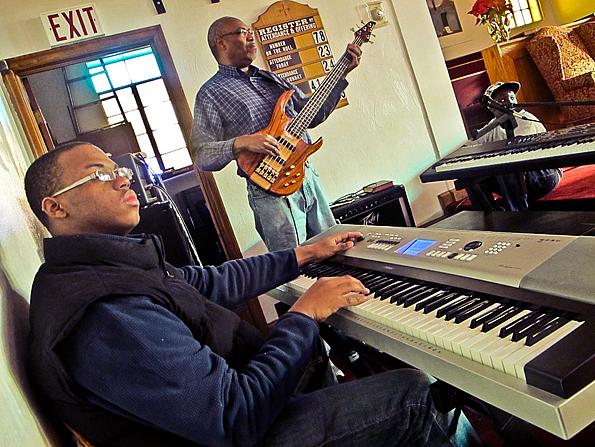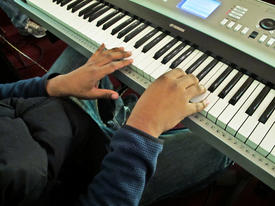Young people contending with diabetes: Diabetes a shocker
West Virginia is among the top five on just about every national chronic disease list. The state leads the nation in diabetes and obesity, according to the Gallup Healthways poll.
This series results from interviewing three young people and their families over a period of about six months. Stories about the need for exercise and healthy diet are common, but little is published about actual children taking steps to do something about it. These stories can inspire others.
Story 1: Teen runs off 100 pounds
Story 2: Teen: Diabetes a shocker
Story 3: Girl, 9, determined to hold off diabetes
Back to Kate Long's Fellowship Project: "The Shape We're in".

INSTITUTE, W.Va. -- The choir's up front in the Nazarene Church, Saturday morning, running through a version of "Glory to the Lamb." Pastor James Patterson is plucking rhythm on the bass guitar. His teenage grandson, Donovan Patterson, adds jazz organ riffs.
Donovan's fingers wander over the keys. He closes his eyes and smiles.
His grandfather has had type 2 diabetes for 20 years. At 16, Donovan is new to it. He was diagnosed last year.
"It's just kind of there in the back of my head now," he said. "It's there, always there, that thought: I'm stuck with diabetes for the rest of my life."
playing. "When I'm in my zone, it's not there. It's the only time it's not there. It's a bummer."
The only time it leaves his mind: when he's
He plays for his grandfather's church and with a gospel group, The Visionaires, in other churches around town. He dreams of going to music school. "I can play just about any kind of music I hear," he says.
'I thought I was going to die'
Donovan weighed more than 300 pounds when he was diagnosed with diabetes in the spring of 2011. He was used to "eating whatever I wanted to eat." His grandfather had been after him for years about it, "but it went in one ear and out the other," he said.
"I kept telling him it's a wicked disease," Rev. Patterson said. "I was constantly saying to him, 'This is real, you can prevent this, you need to be watching this,' because I could see it happening as he gained weight, but you can't make a kid understand that kind of thing.
"I control my own diabetes with diet and exercise now, but it wasn't always that way, so I know what Donovan's going through," he said. "But I'm not sure how real he thinks it is yet."
Used to be, type 2 was called "adult onset" diabetes because people under 25 almost never got it. Nobody calls it that anymore, and nobody knows how many West Virginians under 18 have type 2 diabetes.
"I can tell you, there are a whole lot more than there used to be," said Dr. Jamie Jeffrey, director of children's medicine at CAMC Women and Children's Hospital. "And it's going to keep on increasing if we don't do something about these children's weight."
One in four West Virginia fifth-graders had high blood pressure and cholesterol in 2010, according to West Virginia University's CARDIAC project. One in four fifth-graders was obese. Eighteen percent of kindergartners arrive at school obese. "All those things lead to diabetes," Jeffrey said.
"I worry about our young people," Rev. Patterson said. We see children who are clearly headed that way all the time. There are two fifth-graders now in the after-school program in the same boat. And we do not have a good handle on the extent to which this is happening."
When Donovan was 14, his family doctor told him he was pre-diabetic. The doctor said Donovan could head off diabetes if he'd exercise and quit swallowing so much pop and junk food, but "that didn't mean anything to me," Donovan said.
"I saw the signs, the darkness and bumps on the back of my neck, but I didn't believe it," he said. Even after the doctor said he had full-blown diabetes, he said, "I didn't really get what it was. I heard what they said, but I just kept on doing what I'd been doing."
Then diabetes slammed him, showed him what it can do to a person.
He was cruising along, eating whatever he wanted, not taking his insulin. One day after school, he started throwing up, cramping, doubling over in pain. "I couldn't breathe." It took three days in intensive care at Women and Children's Hospital to stabilize him. He slipped in and out of coma.
"He had DK, which is when your diabetes is really out of control," his grandfather said. Diabetic ketoacidosis, a life-threatening condition, happens when body cells can't get the sugar they need because there's not enough insulin in a person's body.
"I could have died," Donovan said. "That was my wakeup call. Now I believe it. The thought has kicked in: I got to take care of my body."
Now, every day, when he gets up, he checks his sugar. "I have to poke my finger to get the blood levels," he said. "If the number's too high, I have to adjust what I eat or I have to exercise."
His grandmother and grandfather help him. "They're on me, every day," he said, flashing a wide grin. They give him his insulin shot. "I've got to learn to give it to myself, but not yet," he said.
He lost more than 100 pounds, much of it around his DK episode. Can he live a normal life? "Well, yes, he can," his grandfather said. "I do, but I manage my diabetes. That's the thing. You got to learn to manage it."
He's teaching Donovan to cook a healthy diet. "We've been managing his meals for him, but he's got to learn to do that himself. He's making the salad now, and we're starting on healthy ways to cook a chicken soon."
Diabetes damages a person's body, "so you never quite get over it," Rev. Patterson said. "I can't ever take a vacation from it. If I quit eating right for a few days, diabetes lets me know loud and clear that it's there." His vision might get blurry, his breath short.
"You live within certain realities. You pay a big price for diabetes."
You control it or it controls you
"I want Donovan to understand that it's up to him whether he controls diabetes or it controls him," Patterson said. "I don't want him thinking, I've got this because of genetics, or because I'm African-American, or because God did this to me, so there's nothing I can do."
That idea is dangerous, he said. It makes people not try.
"Type 2 diabetes is a lifestyle disease and a cultural disease," Patterson said. "The culture of processed fast food and lack of exercise affects you, regardless of race. And exercise and healthy food will help you, regardless of race."
At the same time, "as a community, we've got to look at the things that make it hard for people to make healthy choices. People's choices are affected by what they can afford to buy for themselves or what's available to them, and in many low-income areas, healthy food may not be readily available, for instance."
People with less money get diabetes more frequently, a lot of research has shown. In West Virginia, the per capita income is 30 percent lower for black people than white people, according to Census data.
In 2007, 14.7 percent of African American adults had diabetes nationwide, compared with 9.8 percent of whites. In West Virginia, the gap was smaller, 13.3 percent for blacks, compared with 10.9 percent for whites, according to CDC.
God didn't do this
Donovan said he has asked God a few times why he got diabetes, but not often. "I know why I got it," he said.
"I hope he won't be thinking God did this to him," his grandfather said. "God has certain natural laws, and one is: If you take in more calories than you burn, you gain weight.
"If I've been constantly eating the wrong foods and too much of them, and I say, 'God, why did you allow me to get this?' then what I'm doing is asking God to violate his own natural laws. I'm asking God to let me do whatever I want to and not suffer any consequences.
For now, Donovan is surrounded by people who encourage him to do what he needs to do. "At least 25 percent of the people in my church have diabetes or some other severe chronic illness," Patterson said. "There's so much diabetes around, we could start thinking it's normal, if some of our members didn't show us it can be prevented."
One of the praise singers, Dreama Williams, said her doctor warned her last spring that she was headed for diabetes. She joined the Public Employees Insurance Agency's Weight Management program and lowered her blood sugar by losing 25 pounds. "It's just something you make up your mind to do, and you do it," she said.
"I'm concentrating on my music," Donovan said. Tim Courts, who plays with the Bob Thompson Unit, has been a mentor. So are Bobby Smith, Jonathan Wesley, Johnathan Smith, all first-rate players.
"Once you've got diabetes, you learn to manage it the best you can," Rev. Patterson said, "and you try to find something you love to do, and you do it. And for him right now, that's music."
Reach Kate Long at katel...@wvgazette.com or 304-343-1884.
"The Shape We're In" was written with the help of the Dennis A. Hunt Fund for Health Journalism, administered by the California Endowment Health Journalism Fellowships at the University of Southern California's Annenberg School for Communication and Journalism.

